Chad Crawford Kinkle’s folk horror
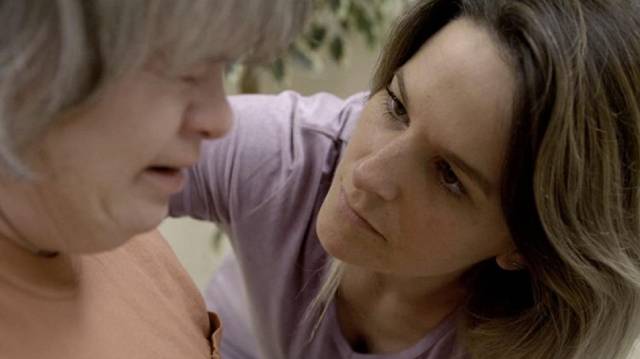
in Chad Crawford Kinkle’s Dementer (2019)
I’ve had a taste for folk horror which goes back at least to some time in the 1970s, back to before I would have been able to put a name to it. Like film noir, folk horror is somewhat amorphous, one of those things which you know when you see it, though your opinions might not be shared by everybody else – does something like Tobe Hooper’s The Texas Chain Saw Massacre (1974) belong? In its most general sense, its subject is the lingering persistence of pre-modern beliefs (and powers) in a post-Enlightenment world, though stories might be set in earlier, non-European cultures.
The genre can encompass films such as Kaneto Shindo’s Onibaba (1964) and Kuroneko (1968), perhaps even Hiroshi Teshigahara’s Woman in the Dunes (1964), as well as Konstantin Ershov and Georgiy Kropachyov’s Viy (1967) and Robert Eggers’ The Witch (2015), but folk horror’s formulation as a distinct cinematic genre probably began in England, where the nation’s history has remained as an active presence through centuries of change, a kind of living force vertically stacked beneath the everyday surfaces of life. It’s there in Michael Powell and Emeric Pressburger’s A Canterbury Tale (1944) and I Know Where I’m Going (1945), through David Rudkin and Alan Clarke’s Penda’s Fen (1974) and Rudkin and Alastair Reid’s Artemis 81, and continues into the present with movies like Ben Wheatley’s A Field in England (2013).
My first encounters were with what are now generally recognized as key exemplars of the genre: Robin Hardy’s The Wicker Man (1973) and Piers Haggard’s The Blood on Satan’s Claw (1971), films which have remained favourites over decades of repeated viewings. These are rooted in the continuing presence of pre-Christian religions in a world generally shaped and defined by Christian beliefs. While Christianity has settled in as a social and political structuring power, ancient forces in these stories retain a deeper, more visceral power, a spiritual reality lost to the usurper religion which has embraced material power in its drive to control society.
*
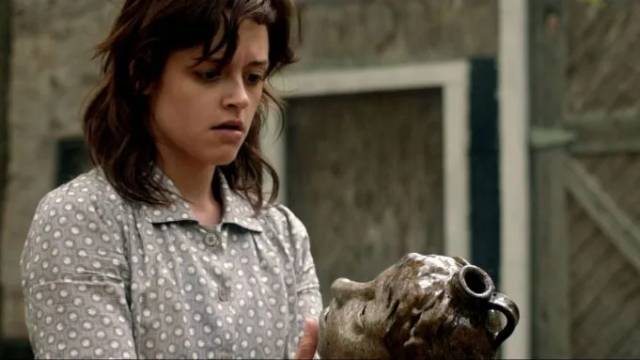
Jug Face (2013)
A few weeks shy of the release of Severin Films’ mammoth folk horror box set, All the Haunts Be Ours, containing twenty features from around the world anchored by Kier-la Janisse’s epic documentary Woodlands Dark and Days Bewitched (2021), I took the opportunity to revisit one of the best more recent folk horror movies, Chad Crawford Kinkle’s Jug Face (2013), which is included as a supplementary disk in Arrow’s release of Kinkle’s second feature Dementer (2019).
This was my third viewing of Jug Face and it remains as impressive as the first time I saw it back in 2017. Kinkle manages to avoid so many potential pitfalls in his portrait of a small Southern backwoods community in thrall to a supernatural entity which maintains their health and security in return for intermittent human sacrifices. When the latest potential victim manages to avoid her fate, all hell breaks loose, with the angry “god” striking out and killing several other people in retribution. The story centres on the young woman Ada (Lauren Ashley Carter)’s internal moral conflict between her desire to break free of this fundamentalist community and her recognition of her personal responsibility to her family and neighbours.
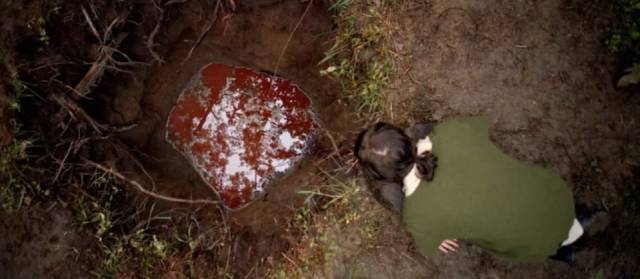
Kinkle never mocks or parodies this community, but rather follows the implications of the reality of this supernatural force for the people who have found a way to live with it. As with The Wicker Man, religion is a malevolent controlling force. But where in Hardy’s film beliefs on both sides of the conflict are seen as illusory, the climactic sacrifice a tragically futile act of senseless violence, in Kinkle’s film the community’s religion has been shaped by a very real need to accommodate the presence of a deadly power which these people have come to uneasy terms with by designating it their god.
The satisfactions of Jug Face lie in Kinkle’s ability to take his concept seriously and follow it to a plausible conclusion, imbuing the fantastic premise with a convincing naturalism. Its depiction of religion exposes the inevitable element of fear with which all supposed gods maintain control over their believers, no matter how hard those believers try to tell themselves that those gods are benevolent.
*
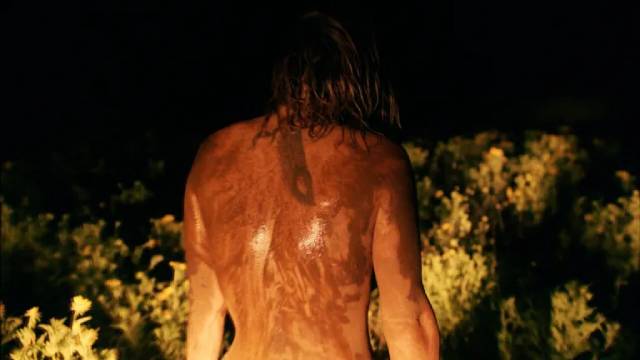
Dementer (2019)
These themes also run through Kinkle’s second feature, Dementer, which is something of a companion piece to Jug Face, with a protagonist who has managed to escape from another backwoods cult – though one more malevolent than the previous film’s community – and who tries to establish some kind of normal life in the outside world while carrying deep emotional and physical scars from her cult experience.
But where Jug Face immerses me in its imaginary world, Dementer is troubling in ways which kept me at some distance. Kinkle conceived the film as a way to work with and honour his sister Stephanie who has Down Syndrome. Much of it is shot documentary style at the centre where Stephanie and others like her are cared for and provided with various activities. But woven into this observational material is a narrative which becomes increasingly horrific and as a viewer I was constantly uneasy, wondering how much the people at the skills centre understood about what they were involved in. Although Kinkle treats them with sympathy and obvious affection, by the end things have become extremely dark and I couldn’t help wondering whether using real people, including his own sister, in this way is defensible.
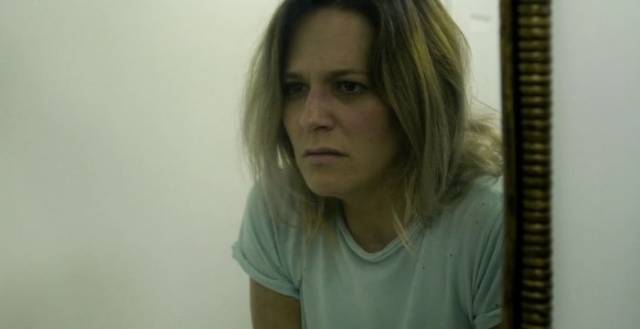
That external moral question aside, Dementer is a creepily effective movie. An evocative, mysterious prologue establishes an almost apocalyptic tone with images of a naked woman standing beside a bonfire in a field at night as an ominous voice slowly counts from one to thirteen amidst layers of voices and threatening sounds, then she’s running across the field pursued by a pick-up truck, unable to escape the beams of its headlights. This oppressive montage gives way to opening credits scrawled in crayon, misspelled, occasionally hard to read (actually drawn by clients of the skills centre), before we are introduced to Katie (Katie Groshong) being interviewed for a job at the skills centre. She seems nervous and a little evasive in some of her responses, but there’s also an obviously genuine warmth which is quite disarming. As the head of the centre shows her around, introducing her to both staff and clients (all non-professionals, their “roles” actually who they really are), Katie displays openness and empathy.
But we can’t help feeling a certain uneasiness because we know that she’s concealing something. We quickly learn that she has lied to her new employer, that she isn’t actually staying in a house just outside town, but is living out of her car, using a gas station restroom to wash up – it’s there that we see the extensive scars on her back, among them the horned symbol of the cult which we see in the flashbacks to her former traumatic existence. And yet we remain sympathetic for a long time – her reluctance to speak of her past is understandable and her attempts to live a “normal” life, particularly her desire to serve others in this job, reinforce that initial appealing impression.
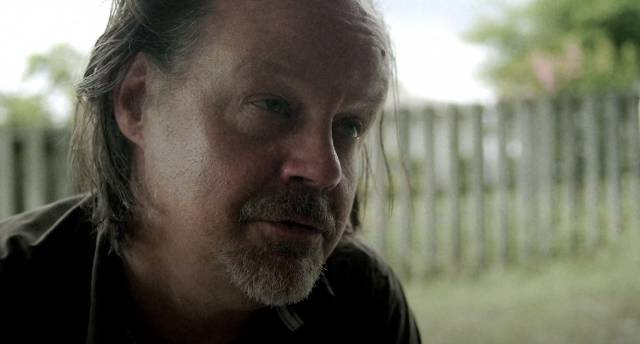
But the weight of her traumatic past isn’t easily shaken off; she’s prone to sudden headaches which trigger disturbing memories which gradually reveal the sinister nature of the cult; there’s no pretense that this group (led by Larry Fessenden, who was also the leader of the community in Jug Face) worships any kind of god – they’re into demons and the abuse Katie was subjected to was designed to groom her as someone who can kill, to offer sacrifices. Katie’s damage blurs the boundary between reality and illusion and she begins to believe that Stephanie, with whom she feels a particular affinity, is under threat from the demons who may have followed when Katie fled the cult.
Katie makes increasingly frantic efforts to protect Stephanie, performing rituals – beginning with wrapping a cow’s heart in mystic symbols and hiding it under Stephanie’s bed in the group home and working her way up to adopting a cat from a shelter and sacrificing it. Under the stress of it all, Katie becomes more careless and her actions are finally discovered by her co-workers and she’s fired. Seen as a potential danger to the centre’s clients, she pleads that she’s only trying to protect Stephanie and that being fired will expose her to terrible danger… Not surprisingly, her employer sees her as deranged and an unacceptable risk.
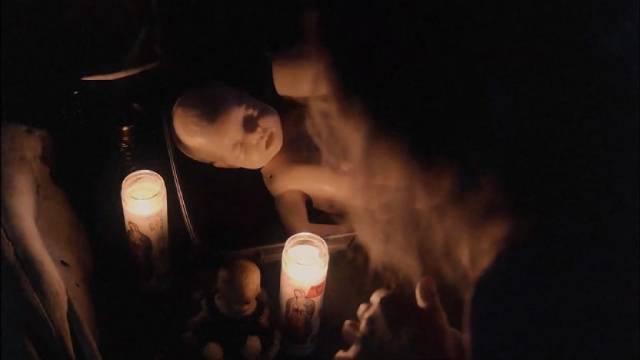
Kinkle has maintained a careful balance throughout; we hold onto the possibility that there may be a real supernatural danger, that Katie could be right and doing what she can to protect Stephanie from malevolent forces which Katie herself may have inadvertently brought with her. Her desperation is genuine, rooted in the possibility that she’s responsible for the threat and the only tools she has to correct the situation are the ones she learned while in the cult. The final twist resolves her dilemma in a particularly bleak way, a kind of mirror image to the ending of Jug Face; there, Ada accepts responsibility and submits to the sacrifice which will end the violence being inflicted on her community, but in Dementer it becomes all too clear that Katie has been manipulated by the cult all along, that her seeming escape has been an unwitting mission to seek out a sacrifice which will unleash another demon on the world. And in the end, she doesn’t really even know what it is she’s done.
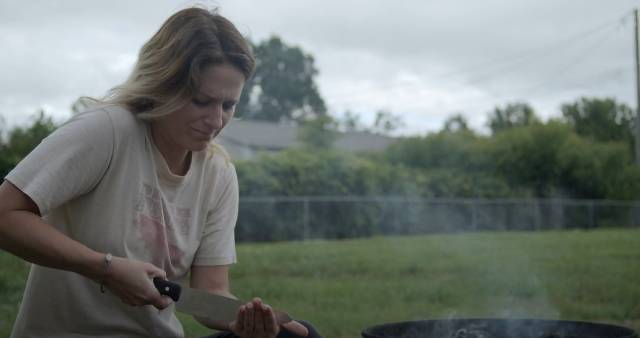
I had conflicted feelings while watching Dementer, feelings which were only reinforced by the disk extras. Despite a fairly elaborate soundtrack which blends understated and evocative music by Sean Spillane with ominous, expressionistic ambiences and effects, the film is quite close to the Dogme 95 ideal: with Kinkle himself operating the mostly hand-held camera, shooting almost entirely with available light, there is a feeling of understated reality to the body of the story – a feeling reinforced by the performances of all the non-professionals in the skill centre. Groshong’s performance is finely calibrated to fit in with the rest of the cast, itself balancing her obvious talent with an unfussy naturalism. On this level, Dementer provides an interesting, unsensational and unsentimental depiction of a group of people living with serious mental and physical challenges. All of this grounds the film in a convincing reality which in turn adds weight and menace to the gradually impinging horror elements. But as effective as those elements are, I couldn’t help feeling that they were being imposed on people who may well not understand what they were involved in was all about.
In the various interviews and the commentary (actually there are three commentaries, but so far I’ve only listened to Kinkle’s solo track), it’s clear that the clients and staff of the skills centre enjoyed working on the film and that there’s a great deal of warmth and affection between Kinkle and Stephanie, but in a way that makes the very dark place to which he takes the character Stephanie all the more troubling. I’m really not sure how to parse the complex interplay of documentary reality and horrific fantasy in Dementer, but maybe that’s my problem, not the film’s.
*
Both films look very good on disk, with Jug Face the more visually rich – this is due to conceptual differences between the two films, not to any inadequacy on the part of Dementer, which by its nature is largely prosaic, the documentary material occasionally punctuated with Katie’s memories/hallucinations. There isn’t a bad performance in either film, professional and non-professional alike, but both films are anchored by very strong performances from their lead actresses, who create complex, nuanced and ultimately tragic characters.
Extras include three commentaries on Dementer, plus interviews with Kinkle and cast and crew members on both disks, several early short films (though strangely not Organ Grinder, which was included on the original Region A Jug Face Blu-ray), and an interesting short piece with Kinkle displaying his own personal collection of “face jugs”, a form of folk art which inspired his first feature.
Comments